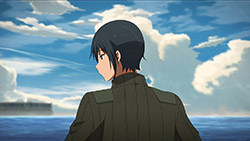 |
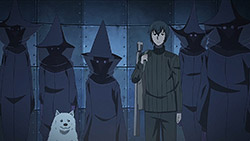 |
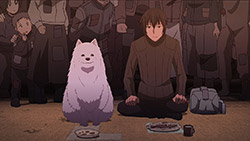 |
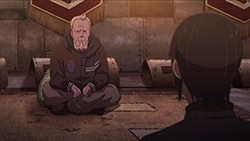 |
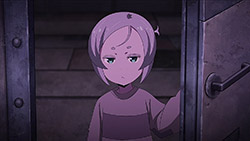 |
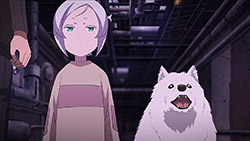 |
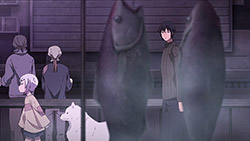 |
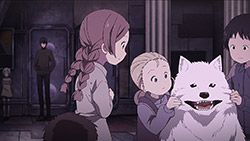 |
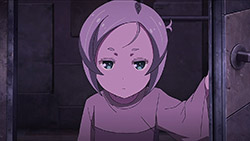 |
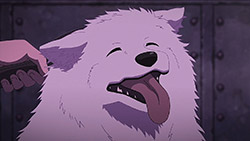 |
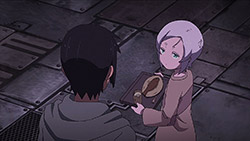 |
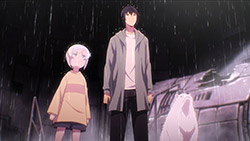 |
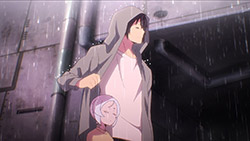 |
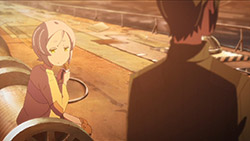 |
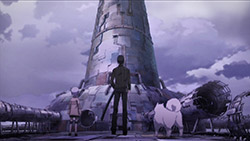 |
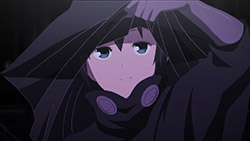 |
 |
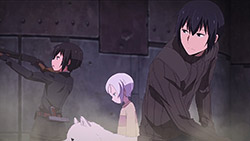 |
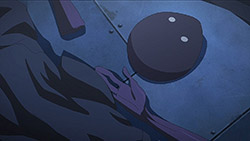 |
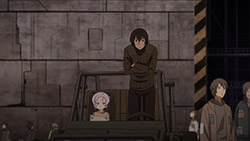 |
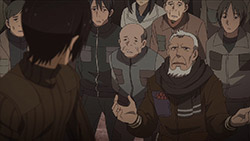 |
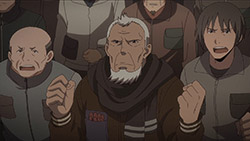 |
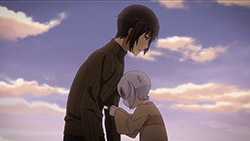 |
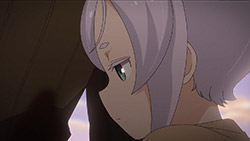 |
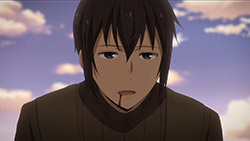 |
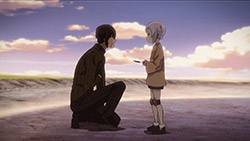 |
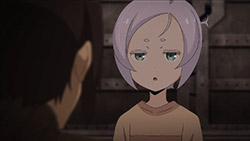 |
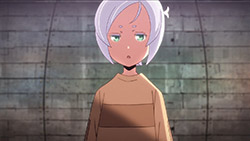 |
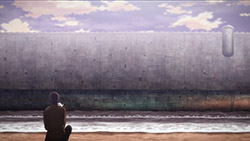 |
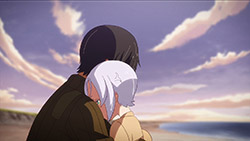 |
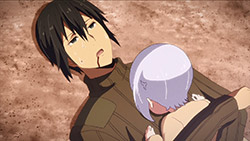 |
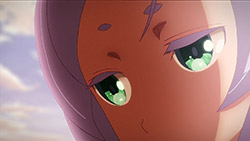 |
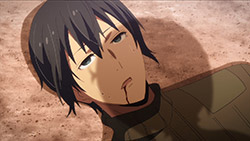 |
 |
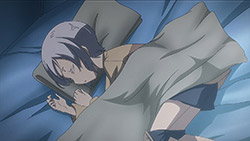 |
 |
「船の国」 (Fune no Kuni)
“Ship Country”
From the very beginning, the episode establishes that Shizu will be the focal point of our look into the Ship Country, but with this comes the consequences of his actions. While Kino has been solely focused on integration and non-intervention, especially after her intervention caused the Colosseum town to fall into disarray, Shizu sets out to right any of the wrongs he sees fit in the Ship Country. Right away, he finds opposition with the lack of concern and empathy the country’s leaders have towards the people that they are watching over, and is proactive in trying to enact change in the town he was visiting.
However, the town’s customs were so heavily ingrained through their history on the ship that it didn’t matter if it were to sink over the years or not because the villagers had never known a life away from the sea. Many are shaken up by the idea that the ground isn’t trembling from the flooding infrastructure or the crashing waves. Shizu’s actions in doing more to fight the established system only unleashed a reactionary tirade against him for getting rid of the town’s leaders by his own volition. It meshes well with the previous episodes as Kino and Shizu’s behavior bounce off of their actions in the last three episodes well. Shizu’s POV functioned well to draw a comparison between him and Kino’s traveling customs, but also contrast the two based on why Kino is less willing to intervene when things aren’t looking so hot.
The one positive aspect about Shizu is that his compassion for those around him is strong. He was perfectly fine with assimilating with the humble townspeople, and he wanted to make sure he was always there to help them. Shizu learns that his intervention was a reckless pursuit the hard way as Ti, the orphan who had acted as his tour guide during his visit, stabs him. But upon realizing that what he said and did was hurtful to Ti, who really didn’t have anywhere to return to, he was quick to defend her and accept her into his life. This was also after she stabbed him in the gut, which goes to show how much regret he felt about initially pushing her away, and how far he’d go to guarantee that Ti would have someone to care for her after all of these years alone without blood relatives that were among the ship’s villagers.
The episode mostly revolves around Shizu’s ethics, his relationship with Ti, and how he contrasts with Kino, so the Ship Country was one of the more simplistic towns they came across. Their rule to let visitors choose between the ruling and working class seems like it was added to portray how differently Shizu and Kino travel and assimilate into whichever town they visit. There isn’t too much in terms of sociopolitical commentary, but as a result, it lets those themes take a backseat in favor of examining the cast’s philosophies as they waver between intervening to right what they see as wrong and letting everything slide, or whether assimilation is as easy for those who haven’t had the chance to travel about to different living conditions.

Wow, that was quick. Thought that this wouldn’t be up til tomorrow.
I’d like to point out just real fast that I haven’t seen the episode yet, and these are my thoughts from the translated story and this review. Reading the review, it’s interesting to think about how different Shizu and Kino are. Kino as a traveler has to look out for herself, so it seems that she can’t intervene unless she’s forced to. Every country has their own customs and traditions, and it’s not really up to a traveler to change all that unless they get involved for a lack of a better word here. Whereas Shizu, probably due to being from royalty, having a strong sense of honor and/or justice, and understanding empathy for the proletariat (I’m not sure if this would be fitting here, but I can’t really think of other appropriate terms; it’s hard to describe here, but I hope you get the idea), he also looks out for himself, but he’s willing to go out of his way to aid those he sees fit.
I am probably overthinking this, but it’s hard to tell whether Shizu or Kino is right in their actions. Both don’t unnecessarily cause trouble, at least in Kino’s case, and Shizu is doing what he feels is right. Kino just does what she does to survive. Neither fully understand the whole situation, so how can one judge which is right and wrong? In some ways, I can understand how Shizu and his ethics compel him to act, and that is admirable; however, I also feel that one shouldn’t act unless you have the strength/conviction/whatever it is to do so. If you can’t take care of yourself, how can you expect to take care of others.
Well, at the end, Ti is introduced, Shizu gains a new companion, and Kino continues her journey doing what she does best. I read a lot of translated stories from the series, so seeing them animated is pretty cool. I hope that they translate stories that I haven’t read yet; that would be quite a surprise. Just off the cuff here, it seems that Kino and Shizu could probably be considered ‘fellow travelers’ or something to that effect. I just hope that in future episodes, nothing like ‘love’ works its way into the show on the main characters. Personally, I don’t think Kino is really well suited for romance.
For whatever it’s worth, even if it will probably never get adapted, I hope that they show Shizu and co. going to the land of dogs.
There’s a painful lesson here – if you want to save others, do so all the way.
Shout out to the first Kino’s Journey anime and it’s opening song.
I prefer the Attenborough approach: sit quietly, observe, and let natural selection run its course.
Normally I wouldn´t agree with that logic but those people were such morons that maybe they deserve what is coming for them, they neglect a child to point of traumatized her and can´t anything to save themselfs even if death is certain and they have a way out!.
As someone who doesn’t read the source material or anything, I thought it brought up some interesting elements, but was still pretty confusing (about Ti). Had to look at some discussion threads to understand better, which isn’t really a good thing. But I enjoyed Shizu as a character enough that it was still really enjoyable, so it’s all good.
Though I don’t get Kino’s comment about being surprised over meeting again, and the discussion threads aren’t giving an answer 🙁
I wonder if some of the reason why the citizens reacted negatively to Shizu’s idea of living in land was because he was an outsider. Personally I’m not sure I’ll choose to forget all I know of my current life and start anew, but I think the deciding factor would be whether I’d be alone or not. If everyone I know is going to stay on the doomed ship, I’d stay and live happily with them. But if everyone decides to try our luck together on land, I’d accept it too, as long as it isn’t just me. But someone else suggesting either option – especially when both options aren’t desirable – would most likely lead to a negative reaction to whatever was proposed, I think. Thoughts?
Shizu met Kino in back in episode 2.
Ignorance is bliss. It’s hard to give up their current lives once they realize that change is upon them. Look at the allegory of the cave. The philosophical idea seems to hold up real well here.
Yeah Kino’s “he’ll be surprised to death” comment made no sense. It almost sounded menacing.
I get the people’s motivation for not leaving the boat–they’ve never known anything else. What bothered me is the fact that they’re nice to travelers, yet they ostracize Ti (offscreen) for being an outsider. Maybe they don’t like her because she’s a permanent resident, but that’s still weird.
The show still does a decent job at telling the stories, but they are still a little vague in that they probably expected viewers to have read the stories before. From what I’ve read, I believe the surprised quote was supposed to hint at something spoilery, but I also got vague answers about the quote.
They got offended because they felt like Shizu was trying to sabotage the only reality they knew.
After thinking of the review some more, I was reminded of the Allegory of the Cave. If you have the chance, check it out.
Essentially, there are people in a cave who have lived chained to the wall, and they face a blank wall. They watch shadows projected on the wall from stuff behind them. The shadows are the peoples’ reality. Now, imagine that one day, one guy escapes his bonds and learns that the shadows are not real and learns their true form. That is the new reality. However, the others have no desire to leave their prison; for they know no better life.
Wikipedia does a better job explaining this, but I think that this is very similar to the peoples’ plight.
Fear of the new things, confuse them and overburden them, there is no one that can cast away this fear in a short time. So they turn back to the world they know. Even if i think their world also needed time to get accustomed
What i want to say: Time is important, and someone Guide. if they feel left alone, they are afraid
or in some other word
Change from Lifetime experiences do not get done in one night or perhaps Generation, the bright future lies with the new dawn or new generation
so, do calm and provide the “middle and old” generation the security feeling so that the new ones can grown up without fear
do not take granted that the young one will love the changes, there are still the (fresh) memories of the past in the heads of the middle and old ones
Oh, i forgot something important
if you find typos of mine, you can take them and add some butter within an pan and cock them over a flame for 5 minutes, than add some fresh wine to the meal. it is delicious
I remember learning of Plato’s Allegory of the Cave, and that illusion of reality is definitely expressed well within the episode. Although Shizu knew of the reality that is outside the ship, the generations of people who have lived with leaks, tremors, and water their entire life recoil at the possibility of being dragged out. The most apparent example would be the child that cries because the ground isn’t shaking, because normalcy had already been dictated for them, and being shown anything different creates a state of crisis.
https://randomc.net/image/Kino%20no%20Tabi/Kino%20no%20Tabi%20-the%20Beautiful%20World-%20the%20Animated%20Series%20-%2004%20-%20Large%2030.jpg
OTP
T
P
Is there any reason they didn’t repair the ship?? They even told Shizu he’d have to work if he chose to bunk with the people, but then kept telling him they was no work?!?
(Also maybe i’ve watched too much anime, but I’m tired of goodie two shoes characters. If a little girl stabbed me, I don’t care if she’s got a tragic backstory, I’m not forgiving her 2 seconds later)
I think it was deliberate as the floods were a part of their life, and they didn’t see it as something that needed to be repaired. If they had leadership to instruct them to repair it or made stops on land to fix it around safer territory, it might’ve given them a reason to have Shizu help them. But it seems like they were too accustomed to their living situation to have it any other way.
It was crazy how lax Shizu was after being stabbed about being diplomatic with Ti, but I guess the remorse hit him harder than the fatal stab wound.
Shizu survived the stabbing, so by definition it was not a “fatal stab wound”.
Anyway, it’s understandable that the people of the ship would continue without repairing the ship.
The people’s logic is: For generations the ship has not yet sunk or ground to a halt due to the leaks, so what does it matter if some more leaks spring up? The ship will keep going, just like always. Besides, none of us know how to “repair the ship” anyway (not that it needs any repairing…).
The choices thing given to travelers who temporarily board the ship was probably an idea the ship’s AI came up with to see if someone would come along and lead the ship’s people to a better way of living (or at least lead them in how to repair the ship). By making it a choice, the travelers feel a bit less pressured into taking up the controlling position. Although Shizu initially chose to bunk with the people, he ended up changing his choice to take on a controlling (ruling) position. But Shizu just wasn’t an effective leader for the ship’s people.